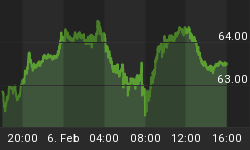I posted a table yesterday showing the public-debt situation of emerging vs mature countries. "The contrast is staggering ... This trend [of escalating debt in mature markets and declining debt in emerging countries] represents a major reversal from the past, when investors in developing economies often had to factor in large sovereign debt, high default risk and wildly fluctuating currencies. Government policy changes have contributed greatly to stronger economic fundamentals in many emerging nations, while policy moves by governments have been a source of weakness and uncertainty in the developed world," said the commentary.
It comes as no surprise that the MSCI Emerging Markets Index has been solidly outperforming the Dow Jones World Index since the low of October 2008, as seen in the relative strength chart below (a rising line indicates outperformance by emerging markets and a declining trend the opposite).

Source: StockCharts.com
But not only are public-debt levels low, company debt-to-equity levels of emerging-market companies are also low and heading lower - UBS predicts a decline to 22% in 2010 from 28% this year (via U.S. Global Investors). UBS also sees an increase in sales growth of 15% and 10% for 2010 and 2011 respectively, translating into a 34% jump in earnings this year and 12% in 2011.
Furthermore, when considering valuations emerging-market stocks appear reasonably priced. "The MSCI Emerging Markets Index has a 12-month forward price-to-earnings ratio of 10.8, which is 15% below the P/E for the MSCI World Index. As shown below, this valuation has rarely been more attractive - it is 15% below the long-term average," said U.S. Global Investors.

Source: U.S.Global Investors - Weekly Investor Alert, July 16, 2010.
As said yesterday, investors could do a lot worse than bargain on the outperformance of emerging-market companies vs their slow-growing counterparts in mature economies for a number of years to come.
Did you enjoy this post? If so, click here tosubscribe to updates to Investment Postcards from Cape Town by e-mail.















